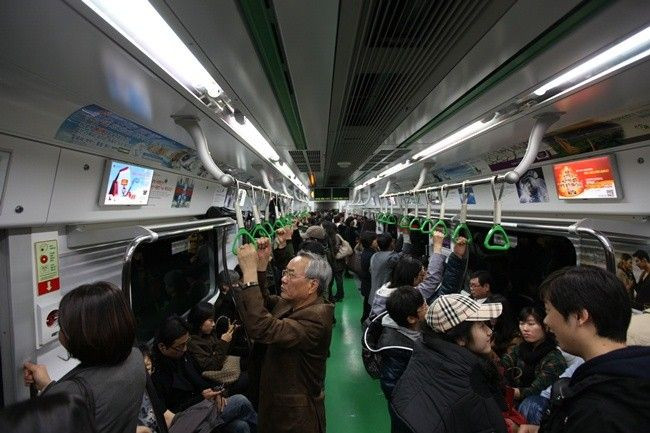Opinion: Seoul subways an eye-opener

From the perspective of this 20-year New York resident, the subway metro system of Seoul, South Korea (much like the city itself) is an eye-pleasing delight and a reminder that living in a large, crowded, urban metropolis can still be a safe, clean and civilized experience.
Having never visited Korea before and lacking any sophisticated, detailed knowledge of its society and culture , I wasn't sure what to expect -- but, of course, I had been aware that Koreans are a highly-industrialzed people enjoying one of the strongest economic advancements on the planet.
Korean subways, like their New York counterparts, are crowded, and filled with people engaged in those favorite activities of the New Millennium: listening to iPods or fiddling around on their Blackberries.
However, thereafter, all other similarities are strictly nonexistent.
Seoul's metros are clean and quiet; people are invariably well-dressed, polite and lacking any kind of overt aggression. No one shouts, nor pushes, nor shoves, nor blocks the entranceway. They wait patently for the next train (if they missed the prior arrival), and allow the other passengers to comfortably exit the car before rushing in.
The subway platforms are devoid of dirt and grime; there is no litter on the ground nor wads of chewing gum that stick under one's shoe; and advertising billboards are free of vulgar markings.
Also, graffitti is an alien concept (although in fairness to the NY Transit Authority, subways there have not been covered in graffitti in about two decades since they built graffiti-resistant trains).
Perhaps most shocking of all to a New York subway denizens, many subway seats in Seoul are covered in a cloth cushion (and none of which have been vanadalized or damaged in anyway, by my observation). And since there does not appear to be too much of an obesity problems in Korea, subway riders occupy just one seat (instead of the two, or sometimes, three, as often observed in New York).
Some cars in Seoul also feature TV screens hanging from the ceiling - although they seem to only broadcast commercials, rather than movies or TV programs. (Plus, the volume on the screens are quiet, the people who are not interested in them are not bothered by them).
And for those Korean straphangers who have some money left on their ticket, they can simply stick the card into a machine and receive a refund for money not used - try doing that with a NYC Metrocard sometime.
The Korean language is certainly indecipherable to a foreign ear, but the sound over the public address system sounds refreshingly clear compared to the garbled sounds one hears in the bowels of Manhattan and Brooklyn.
But what has struck me the most (as a brand new visitor to Korea) is the sense of community these Koreans seem to have. Seoul is a city of some 12-million people crowded into a relatively small area, but everyone (as they pursue their private goals and lives) seem to be united in the cause of making this a very livable and pleasant country.
Perhaps this sense of social cohesion comes from the fact that South Korea lives under a constant state of nuclear threat from its northern neighbor and implacable enemy, the Democrat People's Republic of Korea (or more popularly, North Korea). Indeed, Seoul is located uncomfortably close to the border and the infamous Demilitarized Zone).
I am told, however, that crime and poverty exist in South Korea - in my short time here, I have seen none of either, though that doesn't count for that much. Plus, Korea apparently has a high suicide rate (exacerbated by the recent global economic crisis).
Moreover, maybe it's unfair to even bother comparing Seoul to New York - since one is an ancient place that has acquired centuties of wisdom; while the other, a relatively new, aggressive and immature upstart as cities go.
Plus, Seoul (like Korea itself) is overwhelmingly homogeneous, foreigners appear to represent a tiny proportion of the overall population. New York, by sharp contrast, is renowned for its bewildering racial and ethnic diversity ( as well as its tough, 'take no guff' attitude). One cannot realistically expect New York (and New Yorkers) to change their nature and behavior, of course; similarly, one cannnot imagine the inhabitants of Seoul acting like New Yorkers any time soon either.
These cities are as radically different as the 8,000 miles between them would suggest.
I don't know who are what runs the Seoul subways, but if they're not too busy, they should be placed in charge of the New York underground and relieve the inefficient and bloated NY Transit Authority once and for all.
Indeed, for this jaded New Yorker, the Seoul subways provided an inspiring look at what public transporation could be like if the government and public were unanimously devoted to making urban living as pleasant and civilized as possible.
© Copyright IBTimes 2025. All rights reserved.





















